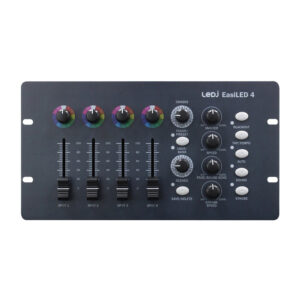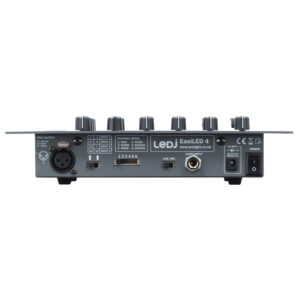DMX Controllers
Take Command of Your Lighting with DMX Controllers. Analogue & Software Options for Seamless Lighting Management.

Showing 1–18 of 20 results
Showing 1–18 of 20 results
DMX Controllers
DMX controllers provide comprehensive command over individual or interconnected lighting and effects fixtures. Equipped with numerous banks and channels, our DMX lighting controllers offer a convenient means to assume authority over your lighting setup and create a visually stunning light show.
A Guide To DMX Controllers
These versatile devices enable precise control over various lighting parameters, including intensity, colour, movement, and timing. With their intuitive interfaces and extensive programming options, DMX controllers provide the utmost flexibility in designing mesmerising lighting setups tailored to your unique requirements.
Not only do they offer exceptional functionality, but they also enhance the overall efficiency of your lighting operations. With the ability to control multiple lighting fixtures simultaneously, you can effortlessly orchestrate complex lighting schemes with minimal effort. This centralised control eliminates the need for manual adjustments and ensures consistent and synchronised lighting effects throughout your entire setup. From small-scale events to large-scale productions, these controllers simplify the management of your lighting systems, saving you valuable time and resources.
In addition to their technical capabilities, they are designed with user-friendly interfaces, making them accessible to both seasoned professionals and enthusiastic beginners. Intuitive controls, visual feedback, and customizable presets empower you to navigate through complex lighting setups with ease. Whether you’re programming intricate lighting scenes or making real-time adjustments during a live performance, controllers provide a responsive and intuitive control experience.
DMX Controllers Explained
These controllers play a crucial role in the realm of lighting fixtures by facilitating the control and manipulation of various lighting effects through the implementation of the DMX protocol. This protocol enables precise management of individual lighting channels, allowing for the creation of dynamic and synchronised lighting displays.
By physically adjusting these controls, users can seamlessly fine-tune the intensity, colour, movement, and other parameters of their lighting fixtures, resulting in a more immersive and personalised lighting experience.
On the other hand, software-based DMX controllers leverage the power of computers or mobile devices to offer a virtual interface for controlling lighting fixtures. This type of controller utilises specialised software applications that can be installed and customised according to individual preferences.
Software-based DMX controllers provide a flexible and adaptable solution, allowing users to design a control interface that suits their specific needs. The virtual interface typically includes intuitive controls and graphical representations of the lighting setup, providing an efficient and user-friendly platform for creating and modifying lighting effects.
Whether you opt for a hardware DMX controller or a software-based solution, both offer advantages depending on the requirements of your lighting setup. Hardware controllers are often favoured in live performances or situations where immediate tactile control is desired.
Conversely, software-based controllers are highly versatile and convenient, especially in situations where complex lighting scenes need to be programmed and recalled, or when integration with other software systems is necessary.
DMX Software and Its Role
To unlock their complete capability, it is essential to have dependable software at your disposal. Software serves as a vital intermediary between your controller and the lighting fixtures, enabling you to program, personalise, and automate an array of lighting effects.
With the assistance of software, you can effortlessly craft intricate lighting designs, fine-tune colour schemes, establish dynamic lighting scenes, and synchronise your lighting setup with music or external cues.
DMX software functions as a versatile toolset that amplifies your creative possibilities. It empowers you to precisely control and manipulate individual lighting channels, granting you the freedom to design captivating lighting sequences with utmost precision.
Through intuitive graphical interfaces and intuitive controls, DMX software allows you to visualise your lighting setup and seamlessly adjust parameters such as intensity, colour, movement, and timing. This level of control enables you to curate immersive lighting experiences tailored to your specific needs, especially useful for moving head lights and lasers.
In addition to manual control, software facilitates automation and synchronisation of lighting effects. You can program sophisticated lighting sequences that unfold automatically, eliminating the need for constant manual intervention.
Furthermore, by integrating your software with external devices or systems, such as audio software or show control systems, you can synchronise your lighting effects with music, performances, or other events, creating a harmonious and impactful sensory experience for your audience.
Advantages of DMX Light Controllers
DMX light controllers revolutionise the way lighting is controlled, offering numerous advantages over traditional methods. These controllers provide precision and control over individual lighting channels, allowing for meticulous adjustments to each fixture’s intensity, colour, and position.
This level of control is particularly crucial when creating captivating lighting displays for various applications such as stage performances, concerts, nightclubs, and architectural lighting. You can achieve the exact lighting effects you envision, enhancing the overall visual impact of your production or event.
One of the key advantages of DMX light controllers is their ability to program and automate complex lighting sequences and scenes. By utilising intuitive software interfaces, you can design intricate lighting changes that unfold seamlessly, without the need for manual adjustments during performances or events.
In addition to precise control and automation, DMX controllers offer the convenience of daisy-chaining. This means that multiple lighting fixtures can be connected and controlled in a series, reducing the complexity and cable clutter commonly associated with traditional lighting setups.
Daisy-chaining streamlines the installation process, simplifies cable management, and minimises the time and effort required to set up your lighting system. This scalability and flexibility make DMX controllers ideal for both small-scale and large-scale applications, providing a streamlined and efficient solution.
Moreover, they are designed to be compatible with a wide range of lighting fixtures, including LED lights, moving heads, strobes, and more. This compatibility allows for seamless integration and control of various lighting elements within your setup, providing a cohesive and harmonised lighting experience.
Choosing the Right DMX Lighting Software
The selection of appropriate DMX lighting software plays a pivotal role in maximising the potential of your DMX controller. It is crucial to consider several factors when choosing the right DMX software, including compatibility with your operating system, user-friendliness, available features, and support options.
Compatibility with your operating system is a fundamental aspect to consider when selecting software. Ensure that the software is compatible with the operating system running on your computer or mobile device, whether it be Windows, macOS, or a specific mobile platform. This ensures smooth operation and eliminates any potential compatibility issues.
The available features within the software are crucial for achieving your desired lighting effects. Look for software that offers a comprehensive set of features, including the ability to program complex lighting sequences, create custom lighting scenes, adjust parameters such as intensity and colour, and synchronise lighting with external cues such as music or timecode. Additionally, having access to a wide range of pre-built lighting effects and templates can expedite the programming process and provide creative inspiration.
Regular software updates and developer support are vital considerations to ensure ongoing compatibility and functionality. Choose DMX software that is actively maintained and updated by the developer.
This ensures that the software remains compatible with the latest DMX controller models, firmware updates, and industry standards. Additionally, reliable technical support from the developer can provide assistance and guidance when encountering any issues or questions during the usage of the software.
Unlocking Creative Potential
DMX controllers and software form a powerful combination that unlocks the ability to create captivating lighting displays in various settings. Whether you are a professional lighting technician or a passionate enthusiast, investing in a DMX controller and compatible software opens up a world of creative possibilities.
With precise control and automation capabilities, you can design immersive lighting experiences that enhance the ambiance and leave a lasting impact on any event or venue. It is crucial to choose the right DMX lighting software that suits your specific needs and stay updated with the latest advancements in DMX technology to fully unlock the endless creative potential it offers.
By incorporating DMX light controllers, and software into your lighting setup, you can revolutionise the way you control and manipulate lighting effects. This combination provides unparalleled creativity and control, allowing you to bring your lighting visions to life with mesmerising precision and brilliance.
Whether you are creating lighting designs for concerts, theatrical productions, architectural installations, or other events, DMX controllers and software empower you to unleash your artistic expression and create stunning visual experiences.
It is important to stay informed about the latest advancements in DMX technology and regularly update your software and firmware to take advantage of new features, improvements, and compatibility enhancements. This ensures that you have access to the most up-to-date tools and functionalities, allowing you to stay at the forefront of the lighting industry and deliver cutting-edge lighting displays.



































